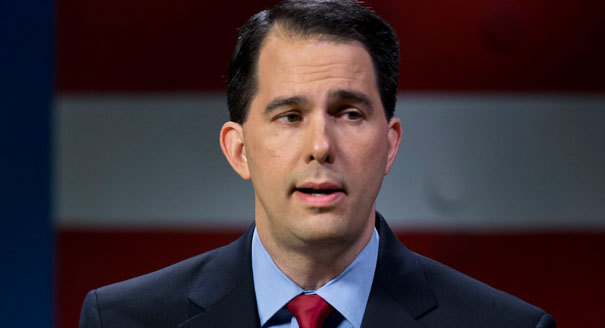Dozens of union-backed protesters descended on the Wisconsin Capitol building protesting Republican Gov. Scott Walker’s budget address, decrying Walker’s rejection of Medicaid expansion, charging Walker would take away their taxpayer-subsidized health care. But several of the protesters would personally benefit from Walker’s plan.
Some demonstrators donned white T-shirts with drawn-on numbers, a symbol of their position in line on a waiting list for BadgerCare, the state-administered Medicaid program.
They railed against Walker’s decision, which would open up Wisconsin Medicaid rolls to some of the poorest Badger State residents while moving others above the poverty line to federally administered health care exchanges.
Apparently lost on many of the demonstrators, led by the activist organization Wisconsin Jobs Now, is that many of those protesters will receive free or subsidized medical coverage under Walker’s plan. More than 92,000 uninsured Wisconsinites will become eligible for Medicaid, according to the state Department Health Services.
“Gov. Walker, he also said ‘no’ to health care, right?” said a woman who identified herself as Katina, a block captain with Wisconsin Jobs Now. “And he said no to security for families.”
Walker’s plan, however, eliminates BadgerCare participation only for non-pregnant, able-bodied adults earning above the federal poverty line—an income of about $11,500 for an individual and $23,500 for a family of four—between the ages of 19 and 64.
Protesters Impacted by Walker’s Expansion
The protesters’ T-shirt numbers—some greater than 100,000—represented their apparent place on the BadgerCare waiting list. The waiting list was created by former Gov. Jim Doyle, who, due to federal funding limits, capped enrollment in the Medicaid program after expanding eligibility.
About 140,000 Wisconsinites are on the waiting list, according to Claire Smith, spokeswoman for the state Department of Health Services.
Under Walker’s plan, those working full-time, minimum wage jobs will move over to the subsidized federal health care exchange, where they’ll pay between $40 and $80 a month for health insurance with greater coverage options than Medicaid.
The rate is similar to the price paid by some individuals on BadgerCare after Wisconsin’s Medicaid premium policy changed in July 2012 to match the structure of President Obama’s health care law.
A woman with number 25,168 marked on her T-shirt and using the aid of a walker, who preferred not to be identified or quoted directly, said she had a disability that prohibited her from working. Under Walker’s plan, however, she would gain access to BadgerCare.
Another protester identified himself as a 63-year-old veteran of the Navy, upset at the U.S. Department of Veterans Affairs for denying him coverage. He said he had never tried applying for BadgerCare and didn’t know how to. He said he retired on a modest, partial pension from Chrysler in Milwaukee and couldn’t afford health insurance. Under Walker’s plan, the disabled veteran would become eligible for BadgerCare.
Exchanges Instead of Medicaid
Another protester in her twenties is receiving state Medicaid and said she will drop off the BadgerCare rolls.
“I made just under enough to get the BadgerCare, but I don’t want it at the expense of somebody else,” said Jasmin Voelz of Wausau. “I don’t want BadgerCare if somebody else is not going to get it because of me.”
She said she preferred that everybody under current requirements be eligible for state Medicaid, which would have been closer to the mark had Walker accepted the federal government’s offer of $4.4 billion over the next several years.
A net 28,000 more people would receive some type of health insurance under the expanded federal Medicaid plan compared to Walker’s plan.
But states eventually would be on the hook for about 10 percent of the expanded Medicaid bill. Walker has said he doesn’t trust a federal government struggling under the weight of a $16.5 trillion debt to come through on its Medicaid promises.
Under Walker’s plan, Voelz would pay about a dollar a day for health insurance coverage under the federal exchange. Some 80,000 Wisconsin residents who are pregnant, disabled, or living in poverty will become eligible for free BadgerCare coverage.
Ryan Ekvall ([email protected]) writes for Wisconsin Reporter, where a version of this piece originally appeared.




